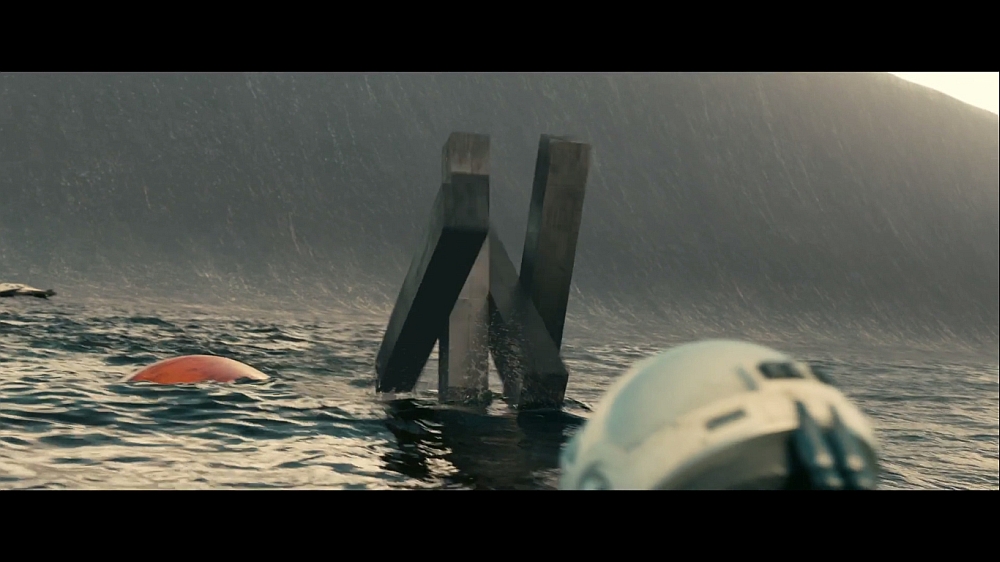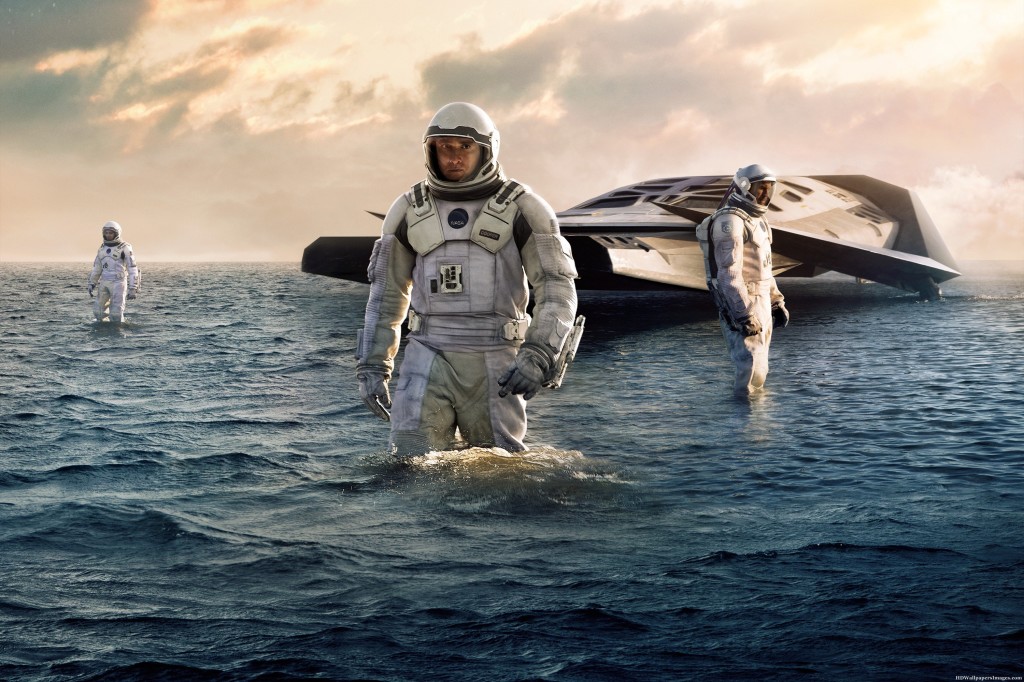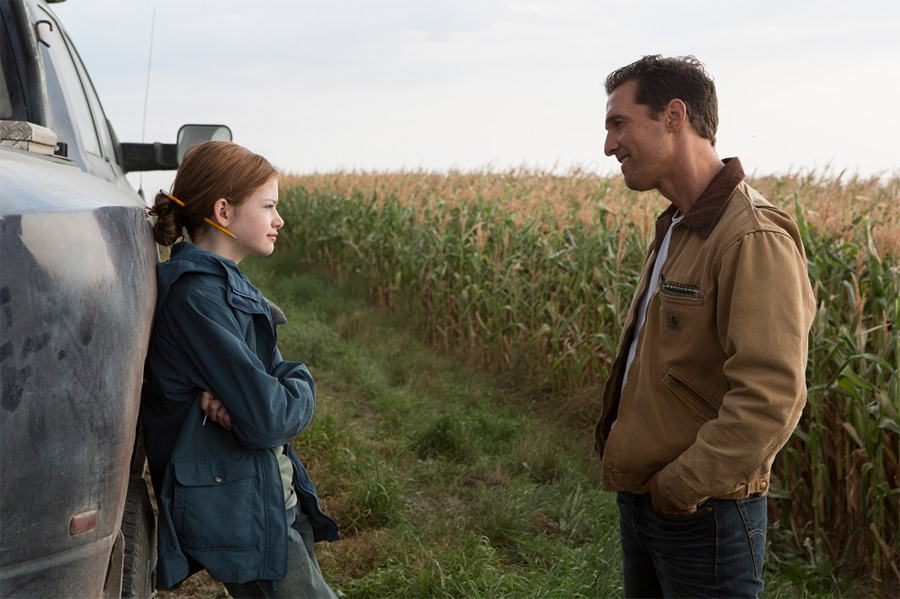Genre: Sci-fi
Premise: A small team of astronauts go out into the universe in search of potential new homes for the inhabitants of earth, who are experiencing a rapidly dying world.
About: Interstellar opened this weekend and did quite well at the box office, finishing in second place (with 50 million) to Big Hero 6 (hey, who’s going to beat an animated Disney movie at the box office?). The project was originally going to be directed by Steven Spielberg many years back (isn’t every movie at some point?). After he left, writer Jonathan Nolan kept working on the script, eventually convincing his brother to direct it.
Writers: Jonathan Nolan and Christopher Nolan
Details: 170 minutes
People seem to be all over the map on this one.
Some critics believe the film is laughable. Yet a lot of commenters (on various sites) have called it a masterpiece.
It seems like you have to either love or hate Interstellar. And as much as I want to fall on one side or the other to give the film/script that definitive stamp of good or bad, the reality is, this is a very mixed bag.
I do want to state the obvious though. Regardless of the quality of the film, Christopher Nolan is doing God’s work. The man is making big-budget original movies when he could be getting paid five times as much doing what everyone else in this town is doing – riding the superhero gravy train. Yeah yeah, he did Batman. But it was clear he didn’t want to make the third one. Which means between this and Inception, the last 7 years or so have been dedicated to infusing the box office with some of the only big-budget original entertainment out there.
Before we get into the juicy details, here’s a breakdown of the plot for those who haven’t seen the film. Coop is a former astronaut in a near-future world that’s running out of food. He somehow stumbles across a hidden NASA base, whose president informs him only hours after he arrives, that they need him to lead a mission to save the world.
They found a wormhole near Saturn that allows them to jump to another galaxy. There are three potentially habitable worlds in this galaxy. Coop is to head a small team that will check out these worlds, and hopefully verify that one is perfect for us to colonize. Coop has to leave his son and daughter for the mission, who we periodically check back in on, all the way into adulthood.
While the first act (which establishes the state of the world) is effective, it’s also really clunky. Early on we get a strange scene where Coop is driving with his daughter (Murph) and spots an “Indian drone” flying around. They chase it through the cornfields (how does a jeep going 30 miles an hour through a cornfield keep up with a drone that’s going 100 miles an hour?).
Apparently, according to Coop, the solar cells on this drone will “power the farm” for years. So they chase it and somehow hack into it with a computer and land it. The scene’s intent is a sweet one – a unique bonding moment between father and daughter – but because the drone causes so many frustrating questions, it impedes upon this intent. It’s an Indian drone? What is it doing in America? Also, if its solar panels can “power the farm for a year,” how come we never see these “solar panels” in action? In fact, I didn’t see any solar panels on the drone at all.
This is followed by one of the most confusing moments in the script. During a dust storm, Murph forgets to close her bedroom window. Dust then flies in and creates a pattern on the floor that Coop believes is a set of coordinates that he must travel to and check out (uh, sure). So he and Murph get in a car, drive all night, until they get to some private land that turns out to be, of all places, NASA, which has been hiding underground for years.
NASA is now run by Cooper’s old boss, Professor Brand, who informs Coop that they’re launching a mission in a week to look for new planets. And, oh yeah, since Cooper is the best astronaut in the world, he wants him to pilot the mission!
Whoa whoa whoa, what???
In old screenwriting circles, this is called: “lazy fucking writing.” So let me get this straight. Cooper finds a space institution he didn’t know still existed through dust coordinates in his daughter’s bedroom, and minutes after he arrives, he’s being asked to join their mission that leaves in a week??? Might that be the single biggest coincidence in the history of the world?
Like many of you, I wondered, if Coop is the best pilot in the world, why didn’t Brand go get him himself? This is “explained” in one of the many cheat lines in the screenplay, with Brand saying something to the effect of, “We didn’t even know you were still alive.” Oh give me a fucking break. You’re about to travel through a wormhole to another galaxy to explore three new planets and you didn’t think to check if the greatest astronaut in the history of the planet was still around?
Anyway.
This is followed by one of Nolan’s biggest weaknesses: clunky exposition. We’re given an extremely elaborate mission breakdown that includes plan As and plan Bs, jumping through wormholes, 12 total worlds, 3 promising worlds, past missions, black holes, singularities, time slippage, one way communication, and, of course, Interstellar’s favorite topic – gravity.
This is where things get really convoluted. Apparently, Professor Brand is working on some sort of gravity displacement technology that will allow him to raise NASA up into space, because the underground NASA structure is also doubling as (get this) a space station. He tells Coop that when he comes back, he’ll have solved this gravity problem, which, I think, means he’ll be able to use gravity to send the whole of earth’s population through the wormhole to one of these new worlds.
Uh, come again?
Anyway, once we get into space, the movie finally starts coming together. Gone are many of the convoluted plot points, and we’re finally able to just… breathe. Or, more appropriately, explore. Actually, that’s not 100% true. There are still some convoluted plot points and exposition, but now Nolan can use our ignorance of space, time, and the universe against us. I don’t know if a Black Hole outer-sphere really makes 1 hour the equivalent of 7 earth years, but it sure sounds cool so I go along with it.
But the exploration of the worlds really was cool. And the worlds allowed the film’s real star to emerge, TARS. If I’m going to take the writers to town for their laziness, I have to give them props for their creativity. TARS was the most original and lovable droid since R2-D2 and C3PO. He was unique and fun and unexpectedly versatile. When he goes to save Brand (Professor Brand’s daughter – played by Anne Hathaway) on that water planet as the tidal wave is approaching and he transforms into some windmill apparatus to speed through the water, it was one of those moments of pure movie magic.
This brings us to one of the most hotly debated segments in the movie (surprise casting spoiler), the Matt Damon sequence. From what I gather, the people who hated the rest of the movie loved this moment. And the people who loved the rest of the movie hated this moment. That’s probably because the Damon sequence was an entirely different genre from the rest of the film – it was a thriller.
I liked it, even if it did feel a bit out of place. The sadness behind that character is what sold it for me. Him being there for so long, all alone. It brings up questions that it sounds like we’ll be dealing with soon – as there’s this “mission to Mars” plan that will entail sending a single person to die on the planet. Along with the other crew member on the previous planet trip having to wait 23 years for Coop and Brand to return (every 1 hour on the water planet equaled 7 years in orbit), there were some really fascinating questions posed here about time and loneliness and its effect on people.
 TARS needs his own movie! Preferably a team-up with John Wick’s dog.
TARS needs his own movie! Preferably a team-up with John Wick’s dog.
Up until this point in the film, I’d probably give Interstellar a double worth the watch. Despite is flaws, its pure grandiosity was magnetic. I think it’s sad that we aren’t pioneers anymore. I was more than happy for Christopher Nolan to show me what it would be like to explore again, even if it was a fictional experience.
And then…
And then Christopher and Jonathan Nolan start the bullshitting. Either that or they got lazy or they simply ran out of time. Because everything that happens in the last 30 minutes of this movie is pure hogwash. It feels like a couple of stoned college seniors forgot their term paper was due the next day, and scrambled to write the last 7 pages in a drug-induced stupor.
I mean come on. Cooper goes into the center of a black hole, encounters a “five-dimensional reality within a three-dimensional space,” which amounts to an infinite recreation of his daughter’s bedroom. In order to stop himself from going on this mission in the first place, he sends binary code through the second hand of an identical watch he gave his daughter…
I mean do I even need to go on? This is such “wrote myself into a corner now I’m going to bullshit my way out of it” I don’t even know what to say. With supernatural set-ups and payoffs, there’s something you need to establish that I call the “Immaculate Connection.” This is where you give the reader enough information so that the payoff’s arrival makes sense.
The Force is a good example. The Force is explained to us. We see it in action numerous times. This helps us understand how it works. Therefore, when Luke uses the Force at the end to destroy the Death Star, it makes sense to us.
This was the opposite of that. This was, “throw as much psychobabble bullshit at the wall as possible in the hopes that the viewer gets distracted enough that whatever vaguely connected payoff we throw at them will be sufficient.” I HATE IT when writers try to bullshit an audience. It’s your due diligence as a writer to give the viewer a satisfactory ending that makes sense within the construct of the imaginary world you’ve created.
I love that IGN (very politely I may add) called Jonathan out on his bullshit in an interview question. And Nolan’s answer verifies my suspicions. He made all this shit up on the fly. Here’s what IGN asked: “So when they find Cooper they are by Saturn again and they have these very advanced ships. So I guess I wondered: Did it take them many years to build the ships? If so, where did they get the resources? Was it on a new planet or on a dying Earth? Also, how did they survive on Earth long enough to build such ships? Or had they gone and colonized in the far reaches of space? In another galaxy? Had they found Brand and very quickly and impressively rebuilt their culture? And if they had gone and colonized, why were they at Saturn again? Right at that exact moment? What are they hoping to find there? If they had found Brand, then she would now be old too, wouldn’t she? Yet, Murph is suggesting that her father go find Brand so that they can build a colony together – which indicates that Cooper and Brand would still be the same age and compatriots. And that they would remain so once he found her in that small ship. Can you explain what’s going on in that scene? And just the science behind it?” Just the fact that someone has to ask a question this complicated shows how messy and thrown together this ending was. Nolan’s response starts with: “I’m happy to try — although I feel like it’s for the viewer to enjoy and trust that we spent and awful lot of time thinking about these things, as we did.” Of course. The old, “It’s up to the viewer.” That works when you’ve created a carefully thought out story. It’s a cop-out when you’ve belittled the audience by giving them a combination of psychobabble and nonsense for the past 30 minutes (you can read the rest of the interview here).
Am I being too harsh on Interstellar? Probably. But I believe Christopher Nolan should be held to a higher standard. He’s shooting for the stars here. So you need to be judged on what your goal was. The goal was a smart epic look at space travel. That’s not what we got. We got an imperfect movie with moments of brilliance, marred by moments of colossal laziness.
MOVIE RATING:
[ ] what the hell did I just watch?
[ ] wasn’t for me
[x] worth the price of admission
[ ] impressive
[ ] genius
SCREENPLAY RATING:
[ ] what the hell did I just read?
[x] wasn’t for me
[ ] worth the read
[ ] impressive
[ ] genius
What I learned: “Cheat lines.” These are lines writers use to cover story problems in their script. Why didn’t they go looking for the greatest astronaut on the planet to head their mission in Interstellar? “We didn’t even know you were still alive.” Why in the world would they not think Coop was alive? Was there any evidence to this theory? What’s the harm in doing your homework and at least trying (it turns out he was only a few hours away!)? A well laid-out plot does not need the writer to constantly cover for it. Your use of a cheat line is indicative of bigger problems in your story. Instead of trying to bullshit the audience with a cheap cover line, go back and fix the underlying problem that’s causing you to cheat in the first place (in other words, it would’ve made much more sense for Professor Brand to show up on Coop’s doorstep and ask him to join his mission).



